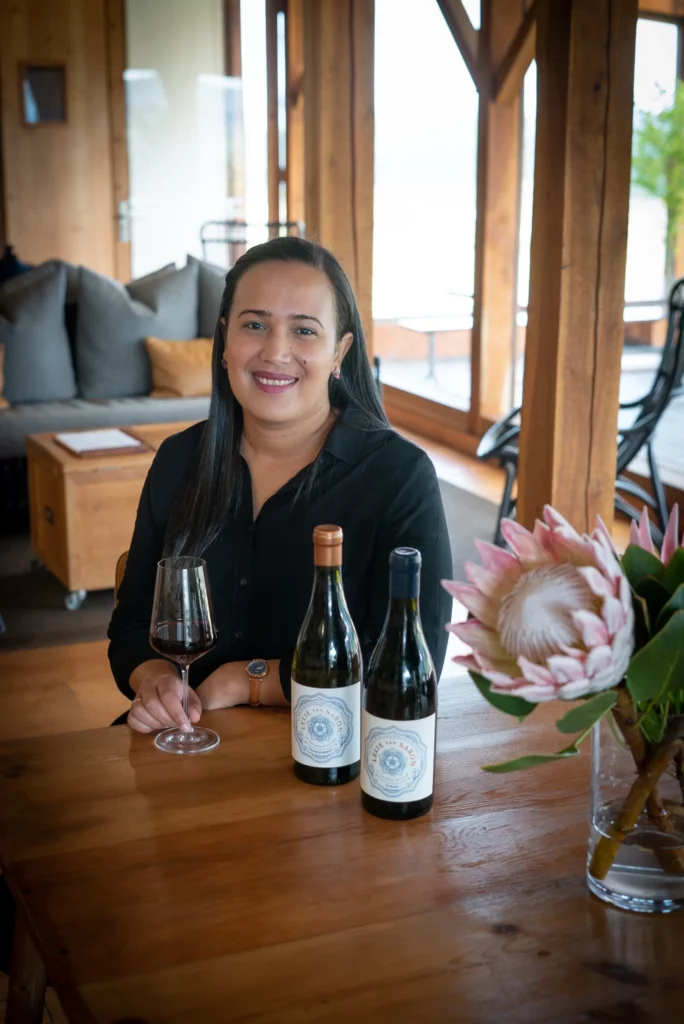SOUTH AFRICAN WINEMAKER BLENDS CAPE TRADITION AND HERITAGE IN HER WINES
When a high school career counsellor recommended that Natasha Williams become a winemaker, she dismissed the idea immediately. She had seen the impact of alcohol abuse in Saron, the rural community in the heart of the Cape winelands where she grew up and wanted nothing to do with the industry.
Inspired by her natural surroundings, Williams decided to pursue a degree in molecular biology at the University of Stellenbosch, but soon found out it wasn’t a good fit for her.
As fate would have it, she met a student studying winemaking and discovered that it aligned with her interest in science.
“And then I realised it’s not too far off from what I think I can do, you know, working with the vineyards and different sites. And there’s this big chemistry and science aspect to it, which I loved. And the fact that I won’t necessarily do the same thing every day,” 34-year-old Williams said.
But the transition was far from easy. First, she had to overcome her preconceived notions about the wine industry, which has a dark history of slavery, land dispossession and worker exploitation. Even among her own family, her career choice was a tough sell. But Williams stood her ground and explained the other side of the coin.
“I think it’s because I started showing the family that it isn’t just what we see, because what we see is a portion of it. We see how people misuse, if I can put it that way,” said Williams, the daughter of a builder and an entrepreneur.
“But it is actually an industry that is worldwide and globally respected for the craft and the skill set that comes with it.”
Lelie van Saron Wine: A Unique South African Boutique Label with a Story
Williams discovered that she could use these skills to pay tribute to her upbringing.
She named one of her wines Lelie van Saron, a clever play on the Biblical references to the rose of Sharon and the lily of the valley, as well as Saron’s location in the lush winelands. It’s also a nod to the local honorific – “lily of Saron” — bestowed on an individual who has done the community proud.
Another wine honours her cousin Jade, an educational psychologist who died of Covid-19, in both name and spirit. A portion of the profits goes to the family foundation, which assists children in the community with everything from sanitary pads to school uniforms.
A third encourages drinkers to “lalela” – the isiZulu word for “listen.” It’s inspired by a presentation that historian Patric Mellet delivered at the Camissa Museum on the history of black people in the wine industry, going back to the 1700s. Williams was particularly struck by the story of Maai Angela, one of the first freed slaves in South Africa to acquire land. In keeping with this forgotten history, they chose the neglected cinsaut varietal to produce a wine that revives the story of the former slave who went on to become a legendary figure during her lifetime.
William’s care for her wines has not gone unnoticed. She has won a number of plaudits since launching her first label in 2019, including a 2024 Ministerial Award for Women Entrepreneurs.
She has also attracted the attention of the government investment agency, Wesgro, which recently invited her and other black winemakers to promote their products to a visiting American delegation that included the mayor of Atlanta, Andre Dickens, and business and government leaders from his city. The visit formed part of the Atlanta Phambili initiative, which aims to encourage investment between South Africa and Atlanta.
A gifted storyteller, Williams was ready with a moving narrative about each of her wines displayed on a table on the vast lawns of the US Consul-General’s picturesque home in Bishop’s Court, Cape Town.
“I think it’s valuable to give South African wine as much exposure as possible, especially in the US market. We still have to do a lot to promote and expose our wine in the US. So, the more exposure, the better,” she said.
Such opportunities are few and far between, though, and years after her entry into the market, she still keeps a full-time job as a winemaker to sustain herself financially.
The Future of Black-Owned Wineries: Natasha Williams’ Vision
Making inroads into an established industry, with generations of family and business networks, is as difficult as working the soil itself. According to South Africa Wine, only 3 percent of local winemakers are black.
Williams’s modest output gives an idea of the odds that newcomers are up against. After starting off with 2,000 bottles in her first year, she now produces 11,000 a year. Compare that to the behemoths in the industry, who produce between 200,000 and two million bottles each year.
The real money lies in the major supermarkets, but that’s out of the question for novices like Williams. The retail giants want volumes that are well beyond the means of most emerging black winemakers. Even if they do land a cherished spot on the shelves of Pick n Pay or Checkers, there’s still the matter of going up against established brands favoured by most consumers.
Williams stays afloat by exporting her wines. She currently sells to seven markets: the US, UK, Australia, Norway, Canada, Reunion Island and Sweden. Even so, her business just about makes ends meet. So, why bother?
“For the love of it,” she said without hesitation. “And I believe I can build a legacy for myself and my family in this industry.”

